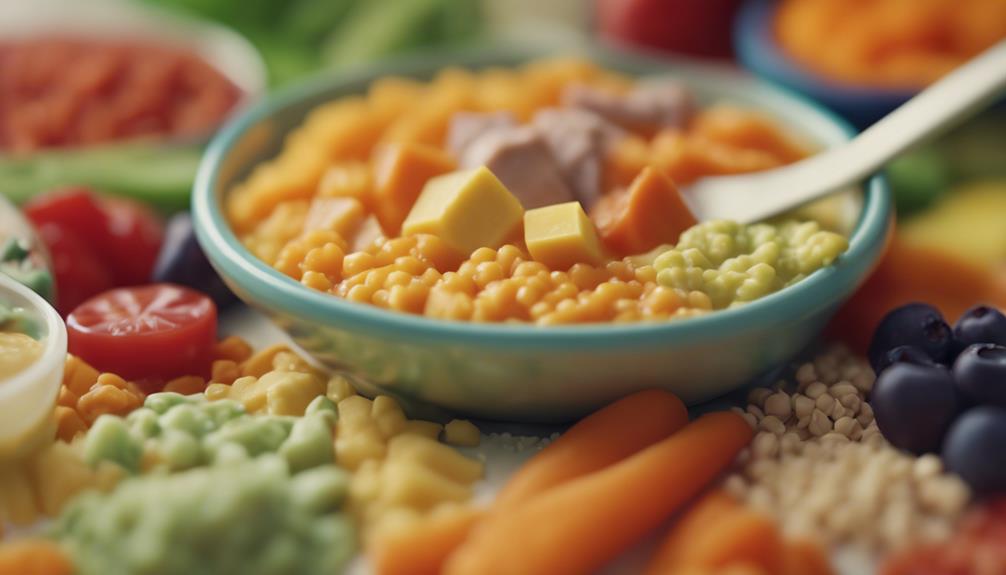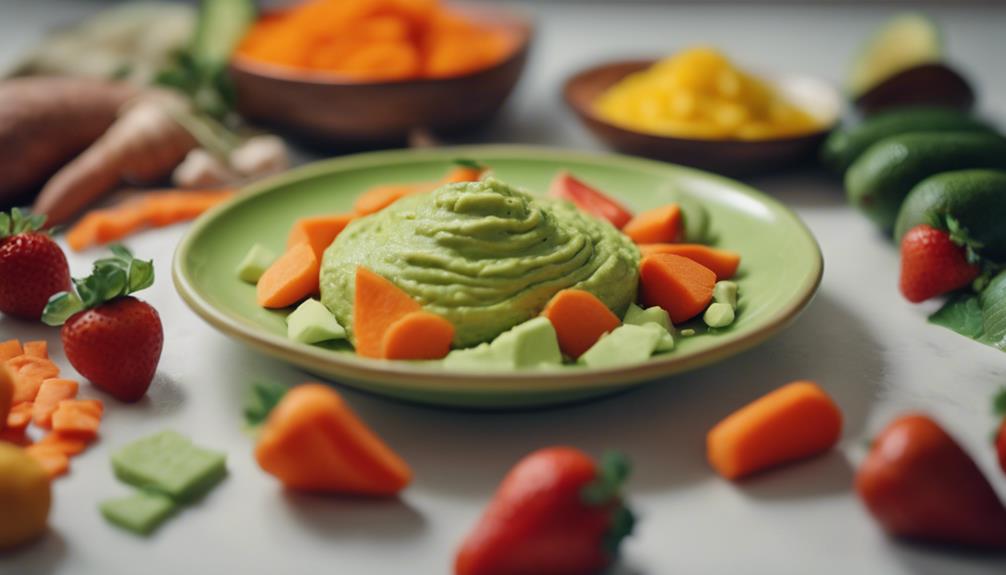Improve your baby’s diet by adding essential nutrients for growth and development. Incorporate iron-rich foods such as spinach, beans, and red meat. Calcium sources like dairy and leafy greens are beneficial for bone health. Fruits like oranges provide Vitamin C to boost immunity. Healthy fats from avocados and omega-3 sources support brain development. Offer a variety of proteins like lentils and chicken for growth. Whole grains and a diverse range of foods help maintain digestive health. Create a well-rounded diet to optimize your baby’s nutrition. More information is available on how to include these essentials for a balanced approach to your baby’s health.
Key Takeaways
- Include iron-fortified foods like pureed spinach and red meat for brain development.
- Offer calcium sources such as dairy products and leafy greens for bone health.
- Introduce vitamin C-rich fruits like oranges and kiwi for immune support.
- Provide healthy fats from avocados and omega-3 sources for brain function.
- Incorporate whole grains like brown rice for essential nutrients and fiber.
Nutrient-Rich Foods for Babies
Include these five nutrient-rich foods in your baby's diet to guarantee ideal growth and development.
Starting with infant cereals, these are often recommended as one of the first foods for babies due to their easy digestibility and fortified nutrients.
Avocado is another fantastic choice, providing healthy unsaturated fats essential for brain development.
Sweet potatoes, rich in beta-carotene, vitamin C, and essential minerals, support your baby's growth and overall health.
Blueberries, bursting with antioxidants, play an important role in eye, brain, and urinary tract health.
For healthy bones and teeth, yogurt is an excellent source of calcium and vitamin D.
Lastly, lentils offer lean protein and fiber, making them an affordable and healthy option for your little one.
Iron-Fortified Baby Foods
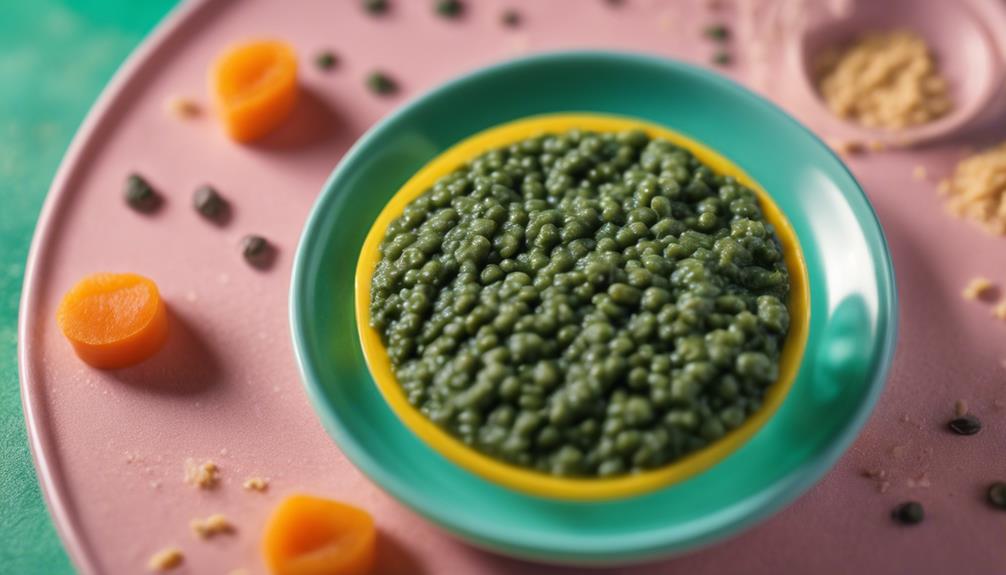
Iron-fortified baby foods play an essential role in meeting your infant's iron needs, especially as their iron stores start to diminish around 6 months.
Incorporating foods like pureed spinach, fortified cereals, beans, red meat, and quinoa can provide excellent sources of iron for your little one.
Importance of Iron
To support your baby's growth and development effectively, incorporating iron-rich foods into their diet is essential. Iron plays an important role in aiding brain function and overall health in infants.
Iron-fortified baby foods such as cereals, pureed spinach, beans, and red meat are excellent choices to meet your baby's iron needs. Infants are particularly vulnerable to iron deficiency, making it crucial to introduce iron-rich foods early on to prevent conditions like iron deficiency anemia.
Regularly including iron-fortified foods in your baby's diet ensures they receive an adequate intake of this essential nutrient. By prioritizing iron in your baby's meals, you're laying a strong foundation for their growth and development.
Iron-Rich Food Sources
When selecting foods to enhance your baby's iron intake, consider incorporating pureed spinach, fortified cereals, beans, red meat, and quinoa into their diet.
Iron-fortified baby foods are essential for infants as iron plays a critical role in transporting oxygen in the blood and supporting the immune system. Babies need sufficient iron intake to prevent iron deficiency anemia, which can impact cognitive development.
Introducing iron-rich foods early in your baby's diet helps establish healthy eating habits and guarantees adequate nutrient intake. Pureed spinach is a great choice due to its high iron content, while fortified cereals provide a convenient way to boost your baby's iron levels.
Beans, red meat, and quinoa are also excellent sources of iron that can contribute to your baby's overall development. By incorporating these iron-rich foods and iron-fortified baby foods into your baby's meals, you're providing essential nutrients that support their growth and well-being.
Nutritional Benefits
Enhance your baby's nutritional intake by incorporating iron-fortified baby foods into their diet to support healthy blood production and cognitive development.
Iron-fortified baby foods are essential in preventing iron deficiency anemia, a common concern in infants due to their rapid growth and inadequate iron reserves. These foods play an important role in cognitive development, as iron is essential for brain function and overall neurological health.
Options such as cereals, pureed spinach, beans, and red meat provide a bioavailable source of iron, ensuring that your growing baby receives the necessary nutrients. Adequate iron intake is imperative for healthy blood production and immune system function, making iron-fortified foods a cornerstone of your baby's diet.
Calcium Sources for Baby's Diet
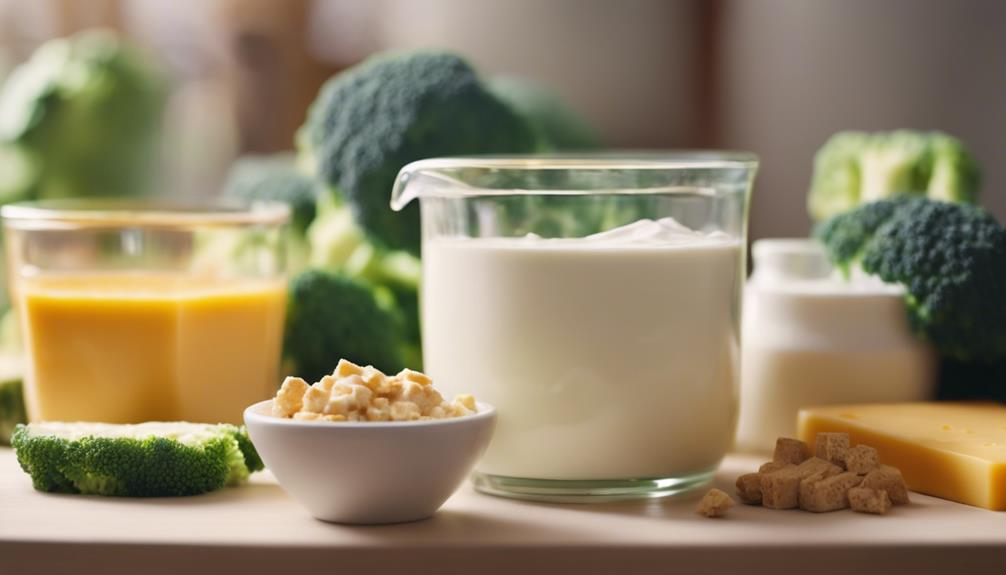
Calcium is essential for your baby's bone development, muscle function, and nerve signaling. Including dairy products like milk, cheese, and yogurt can help meet their calcium needs.
Don't overlook leafy greens and other non-dairy options to guarantee a well-rounded diet for your little one.
Dairy for Calcium
For the best bone development and overall health of your baby, incorporate dairy products like milk, cheese, and yogurt into their diet for essential calcium intake. Calcium plays an important role in the formation of healthy teeth, bones, muscles, and nerve function in growing babies. By including dairy in your baby's diet, you can guarantee they receive a sufficient amount of calcium necessary for their ideal growth and development.
Yogurt, a dairy product rich in calcium, also contains live cultures that provide probiotics. These probiotics support a healthy gut in babies, aiding in digestion and boosting their immune system.
When introducing dairy products like milk, cheese, and yogurt to your baby, do so gradually. This allows you to monitor for any signs of lactose intolerance or milk allergies that your baby may exhibit. By incorporating dairy into your baby's diet, you're providing them with essential nutrients for their overall well-being.
Non-dairy Options
Looking for alternative sources of calcium for your baby's diet? Non-dairy calcium sources are essential for promoting your little one's bone health. Incorporating calcium-rich foods in your baby's diet is important.
Think about including fortified orange juice, fortified cereals, and leafy green vegetables such as kale and broccoli. Tofu, almonds, and sesame seeds are excellent non-dairy options packed with calcium that are suitable for your baby. Additionally, calcium-fortified plant-based milk alternatives like almond or soy milk can provide the necessary calcium intake for your baby's growth.
Beans, lentils, and chia seeds are other plant-based sources of calcium to include in your baby's meals. By offering a variety of non-dairy calcium sources, you can make sure that your baby receives adequate amounts of this essential mineral to support their overall development.
Calcium-rich Recipes
Consider incorporating delicious and nutritious recipes rich in calcium to support your baby's bone development and overall health. Calcium-rich foods like yogurt, cheese, and fortified cereals play an important role in ensuring your baby receives the necessary nutrients for healthy teeth and bones.
Including leafy greens, almonds, and milk in your baby's diet can also help maintain adequate calcium levels. To incorporate these essential nutrients, you can try preparing recipes such as spinach puree, cheesy broccoli bites, or yogurt parfaits.
Remember that calcium sources are equally essential for toddlers, so offering calcium-fortified foods like almond milk or tofu can further support their growth and development. Experimenting with calcium-rich finger foods such as cheese cubes, sliced apples with almond butter, or yogurt-covered berries can make mealtime both fun and nutritious for your little one.
Make the most of these calcium-rich options to promote your baby's overall well-being.
Vitamin C-Rich Foods for Babies
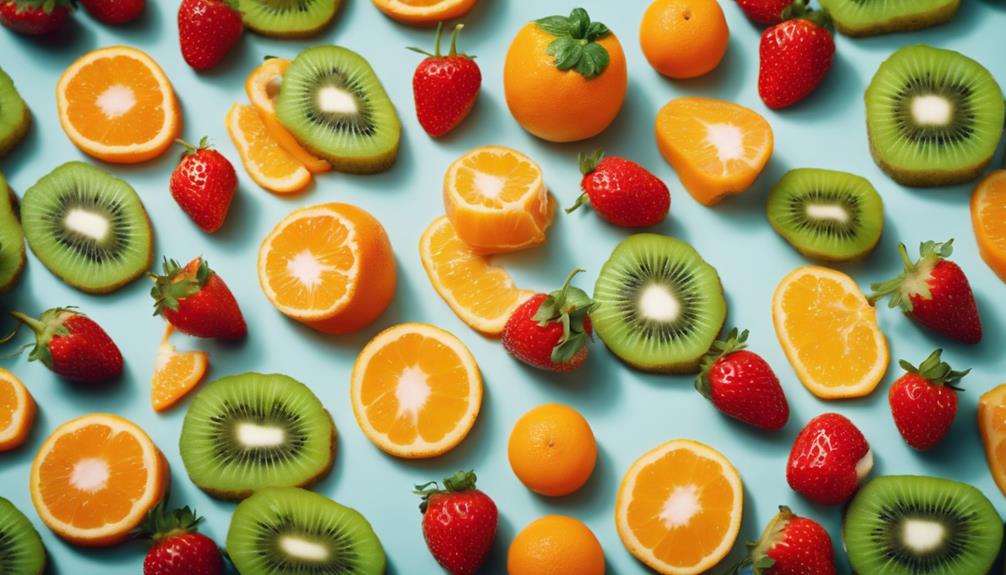
Including vitamin C-rich foods in your baby's diet is vital for supporting their immune system and overall health. Vitamin C plays an important role in helping babies fight off infections and maintain healthy skin.
Introducing fruits like oranges, kiwi, and strawberries can provide a natural sweetness while delivering a powerful dose of this essential vitamin. Oranges, with their juicy goodness, not only boost the immune system but also aid in skin health.
Kiwi, a fiber-rich fruit, promotes digestion and supports overall well-being in babies. Bell peppers, in their vibrant colors, offer a tasty way to incorporate vitamin C into your baby's meals, essential for their growth and development.
Tomatoes, versatile and packed with antioxidants, help protect your baby's cells from damage. Lastly, the sweet and nutritious strawberries contribute to your baby's growth and strengthen their immune system.
Including these vitamin C-rich foods will ensure your baby receives the necessary nutrients for a healthy start in life.
Healthy Fats for Brain Development
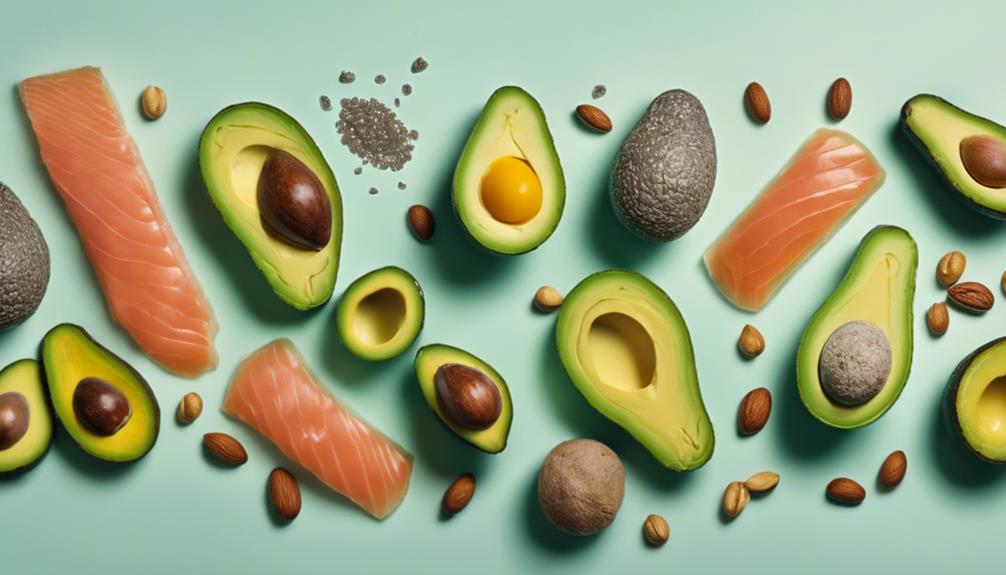
Healthy fats are vital for your baby's brain development. Essential sources of Omega-3 like salmon and flaxseeds, along with nutrient-rich avocados, provide the necessary fatty acids for best brain growth.
Including these foods in your baby's diet can support their cognitive function and overall brain health.
Essential Omega-3 Sources
Opt for incorporating essential Omega-3 sources into your baby's diet to promote healthy brain development.
Omega-3 fatty acids, found in fatty fish like salmon, sardines, and mackerel, are important for brain development in babies and toddlers. These fatty acids, specifically DHA and EPA, play a key role in supporting brain health and function. Including Omega-3 rich foods in your child's diet can greatly contribute to their cognitive development and overall brain health.
If your baby follows a vegetarian or vegan diet, you can opt for plant-based sources of Omega-3 such as chia seeds, flaxseeds, and walnuts. These alternatives can provide a good amount of Omega-3 to support your baby's brain development.
As you introduce solid foods to your baby, consider incorporating these Omega-3 rich options to make sure they receive the essential nutrients needed for their growing brain. By including a variety of Omega-3 sources in your baby's diet, you can help establish a strong foundation for their cognitive development.
Nutrient-Rich Avocadoes
Avocadoes are an important addition to your baby's diet, providing essential healthy fats necessary for brain development. These nutrient-rich fruits are packed with healthy unsaturated fats, which are essential for the growth and development of your baby's brain.
The fat composition of avocadoes closely resembles that of breast milk, making them an excellent choice for infants as they support cognitive function and neural development.
In addition to healthy fats, avocadoes also offer a range of essential nutrients such as vitamins E, K, C, and B6. These vitamins play a significant role in supporting your baby's overall health and well-being.
By including avocadoes in your baby's diet, you can help boost their cognitive development, promote healthy growth, and provide them with a creamy and delicious first food as they start exploring solid foods.
Variety of Whole Grains for Babies
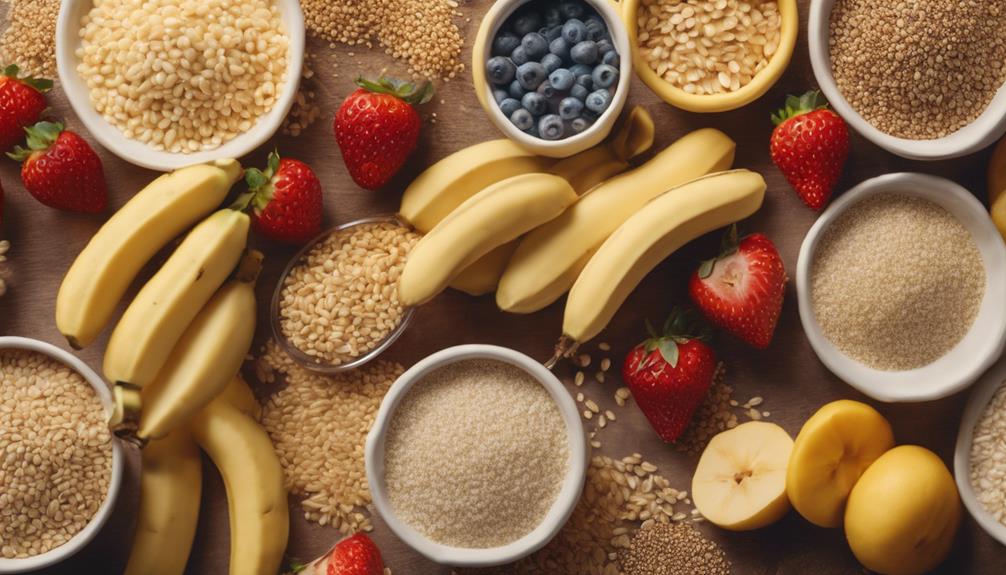
Introducing a variety of whole grains early in your baby's diet can greatly contribute to their growth, development, and overall well-being. Whole grains such as brown rice, quinoa, and whole grain bread are packed with essential nutrients and fiber crucial for your baby's health. By including whole grains in their diet, you can help establish healthy eating habits and promote digestive health from a young age. These grains also serve as an excellent source of energy, perfect for keeping your active little one fueled throughout the day.
Diversifying your baby's diet with a variety of whole grains like barley and whole grain pasta can offer different textures and flavors, making mealtime more exciting. Gradually introducing these options allows your baby to experience a range of nutrients, supporting their overall health. By incorporating whole grains into your baby's meals, you're laying a strong foundation for their well-being and future eating habits.
Protein-Rich Foods for Baby's Growth

Incorporating protein-rich foods in your baby's diet is essential for supporting their growth and development. Foods like lentils, chicken, and tofu play an important role in providing the necessary nutrients for your baby's overall well-being. Lentils are a great plant-based source of protein, fiber, and essential nutrients, making them an excellent choice for your baby's diet.
Chicken and tofu offer high-quality protein that's essential for muscle and tissue growth in babies. Chicken provides a rich source of animal protein, while tofu, being soy-based, is a suitable alternative for vegetarian or vegan babies to meet their protein needs.
Including a variety of protein foods like lentils, chicken, and tofu ensures that your baby receives the necessary nutrients for healthy development. These options offer a balanced mix of proteins and other essential nutrients that are beneficial for supporting your baby's growth during this critical stage of their life.
Foods to Support Digestive Health
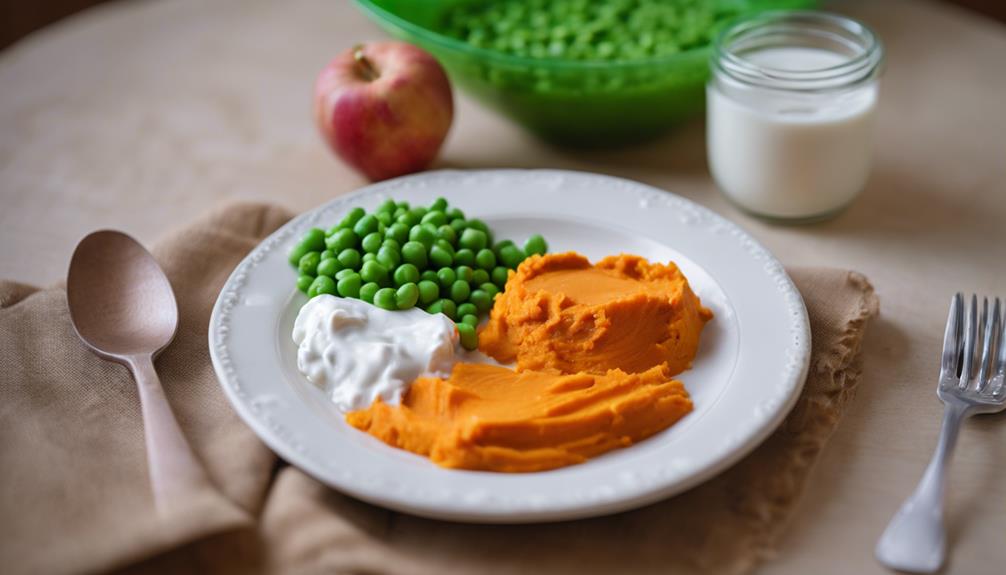
Enhancing your baby's digestive health can be achieved by incorporating foods that support a healthy gut ecosystem. When it comes to promoting good digestion in infants, consider including foods rich in probiotics, fiber, omega-3 fatty acids, and whole grains in their diet. These nutrients play an important role in maintaining a balanced gut microbiome and supporting overall digestive function.
Check out the table below for some excellent options to support your baby's digestive health:
| Digestive Health Foods | Benefits |
|---|---|
| Yogurt with probiotics | Promotes healthy gut bacteria |
| Applesauce | Good source of fiber |
| Chia seeds | Provides omega-3 fatty acids |
| Whole grains | High in fiber content |
Including these foods in your baby's diet can help ensure a healthy digestive system, promoting regular bowel movements and overall well-being. Remember to introduce new foods gradually and consult with your pediatrician for personalized recommendations.
Well-Rounded Baby Diet Essentials
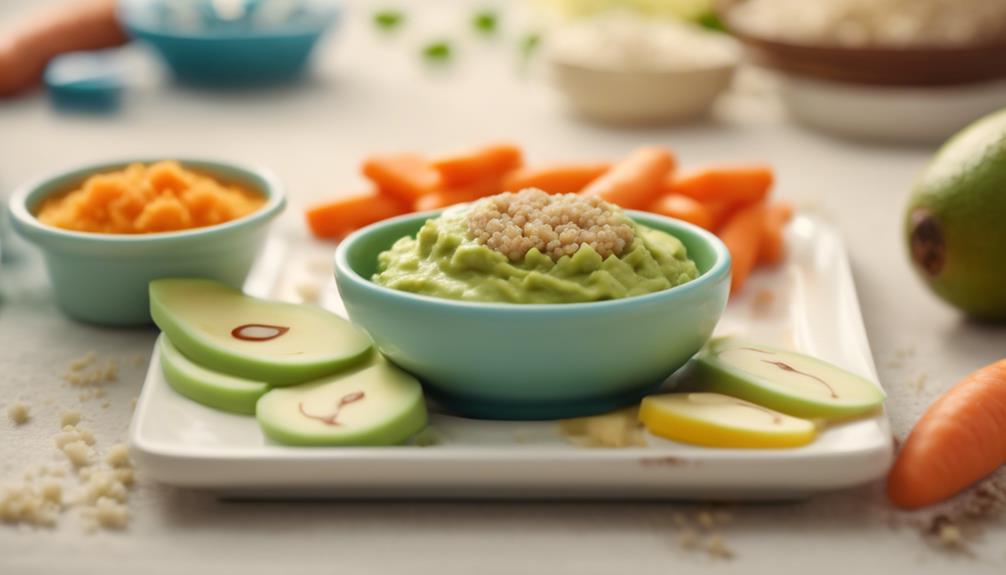
Guarantee your baby's diet is well-rounded by including a variety of essential food groups to support their growth and development.
Nutrient-rich foods like avocados, sweet potatoes, blueberries, and lentils are important for providing the necessary vitamins and minerals for healthy development.
Iron-fortified foods such as pureed spinach, fortified cereals, and red meat are essential to prevent iron deficiency, which can impact your baby's cognitive and physical growth.
Including calcium sources like milk, cheese, and yogurt in their diet supports strong bone development as they grow.
Additionally, vitamin C-rich foods like oranges, kiwi, bell peppers, and strawberries can boost their immunity and overall health.
Optimal Nutrition for Baby's Development
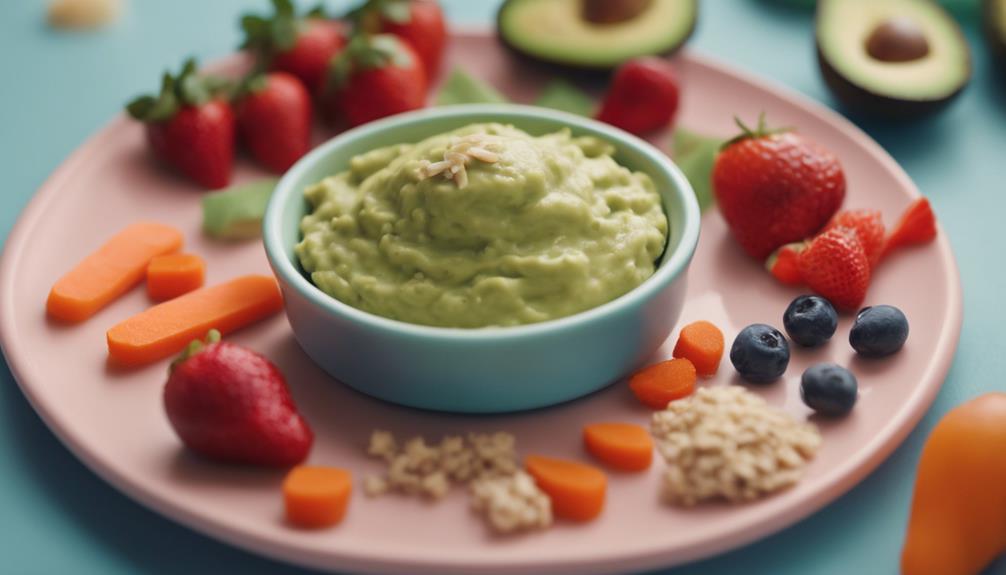
To support your baby's development effectively, prioritize providing excellent nutrition through a varied diet rich in essential nutrients. Breast milk plays a vital role in meeting your baby's energy and nutrient needs during the first year of life.
Introducing a variety of soft foods alongside breast milk helps complement its advantages and supports your baby's growing nutritional requirements. Including animal products, fruits, and vegetables in your baby's diet daily ensures a diverse range of nutrients essential for best development.
Remember to introduce solid foods after breastfeeding sessions to maintain the frequency of breastfeeding for nourishment. Starting with small portions of soft foods like porridge or mashed fruits and vegetables allows your baby to adjust to new flavors and textures gradually.
Frequently Asked Questions
What Is a List of Healthy Food for Baby?
When contemplating what to feed your baby, it is crucial to include nutrient-rich options like avocado, blueberries, lentils, yogurt, and meat. These foods provide crucial nutrients for your baby's growth and development, ensuring a healthy diet.
What Should a Baby Eat on a Balanced Diet?
To maintain a balanced diet for your baby, include a variety of fruits, veggies, grains, proteins, and dairy. Foods like avocados, sweet potatoes, blueberries, and lentils provide essential nutrients. Iron-fortified options such as spinach, beans, and meat help prevent deficiencies.
What Are Healthy Foods to Have a Baby?
When raising a baby, focus on providing nutrient-rich foods like avocados, blueberries, lentils, meat, and yogurt. These items contribute to brain development, eye health, growth, and bone strength, ensuring a well-rounded diet for your little one.
What Are Healthy Eating Ideas for Babies?
When it comes to healthy eating ideas for babies, remember to offer a variety of nutrient-rich foods like avocados, sweet potatoes, and blueberries. Introduce iron-fortified options such as pureed spinach and beans to support growth and development.
Conclusion
To sum up, ensuring your baby's diet is filled with nutrient-rich foods is crucial for their growth and development. From iron-fortified baby foods to protein-rich options, every bite counts towards their overall health.
So, remember to include a variety of foods to support their digestive system, brain development, and overall growth. With a well-rounded diet, your baby will thrive and reach their full potential.
So, get ready to watch them grow and flourish with every nutritious bite they take!

